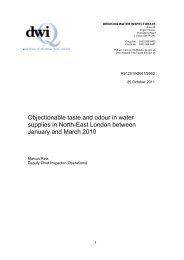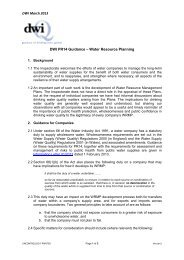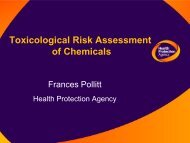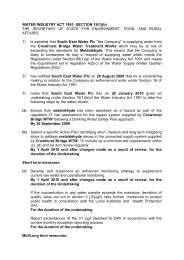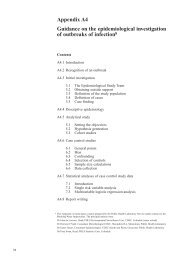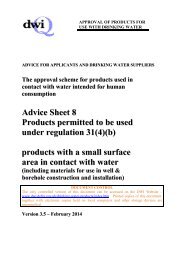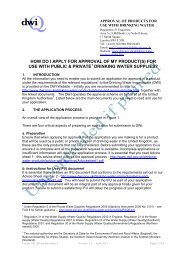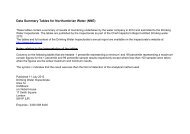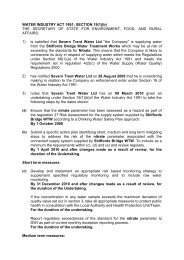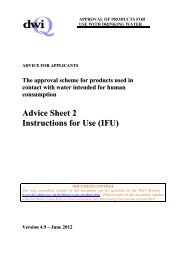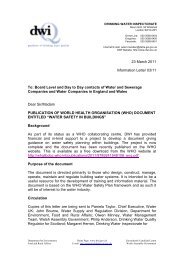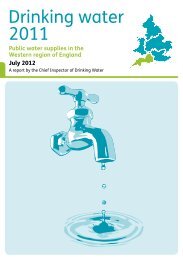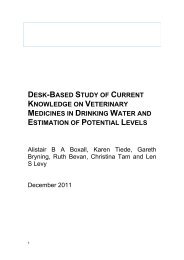Regulation 5(1) - Drinking Water Inspectorate - Defra
Regulation 5(1) - Drinking Water Inspectorate - Defra
Regulation 5(1) - Drinking Water Inspectorate - Defra
Create successful ePaper yourself
Turn your PDF publications into a flip-book with our unique Google optimized e-Paper software.
<strong>Regulation</strong> 5(1) 1 – Use of products or substances in<br />
private water supplies<br />
What does <strong>Regulation</strong> 5(1) mean?<br />
There are potentially many products and substances which may come into contact<br />
with water from the point of abstraction to the point of consumption – for example the<br />
surfaces of pipes, tanks, treatment chemicals or filter media, point of use devices<br />
and other types of water fittings such as components of meters, pumps, and valves.<br />
The purpose of this regulation is to prevent the use of products or substances known<br />
to have a detrimental effect on the safety or quality of drinking water.<br />
How does this work in practice?<br />
The regulation applies to usage of products and substances after 1 January 2010<br />
(i.e. it is not retrospective) (or 26 May 2010 in Wales). Any new usage of a product or<br />
substance in a private supply is covered by <strong>Regulation</strong> 5(1). This means that there<br />
must be documentation in place to demonstrate that prior to use checks were<br />
undertaken to ensure that the product or substance was permitted for use under<br />
<strong>Regulation</strong> 31 of the <strong>Water</strong> Supply (<strong>Water</strong> Quality) <strong>Regulation</strong>s 2000 or equivalent<br />
<strong>Regulation</strong>s in Wales.<br />
What do local authorities need to know about products/substances to check if<br />
they comply with <strong>Regulation</strong> 5(1)?<br />
Local authorities should be satisfied that the products and substances in use in a<br />
private supply are documented as part of any risk assessment, any investigation or<br />
any improvement works. Products or substances meeting one (or more) of the<br />
following criteria may be considered as complying with regulation 5(1):<br />
1. Listed in the Secretary of State‟s list of approved products for use in Public<br />
<strong>Water</strong> Supply in the United Kingdom (current version is available on the DWI<br />
website);<br />
2. Listed in the <strong>Water</strong> <strong>Regulation</strong>s Advisory Service (WRAS) <strong>Water</strong> Fittings and<br />
Materials Directory (available on the WRAS website: www.wras.co.uk) as<br />
suitable for use in plumbing systems within buildings;<br />
3. The particular usage of the product/substance results in either a minimal surface<br />
area exposure or a transient contact time with water and testing using BS6920<br />
methodology has shown that the product/substance does not give rise to an<br />
objectionable taste or odour and does not encourage microbial growth.<br />
1 The equivalent in Wales is <strong>Regulation</strong> 4(a) in The Private <strong>Water</strong> Supplies (Wales) (Amendment) (No.2) <strong>Regulation</strong>s 2010<br />
1
4. Treatment chemicals conforming to a BS:EN standard and dosed in<br />
accordance with any national conditions of use (Current BS:EN standards and<br />
conditions of use are shown in the Secretary of State‟s List of approved products<br />
for use in Public <strong>Water</strong> Supply in the United Kingdom).<br />
5. Included in the Transitional List of traditional products and substances for<br />
use in Private <strong>Water</strong> Supplies. To be included by DWI on this list the supplier or<br />
operator or local authority will have provided evidence of usage in at least three<br />
different private supplies for at least 12 months prior to the <strong>Regulation</strong>s coming in<br />
to force 1 January 2011. The transitional list will be maintained on the private<br />
water supplies section of the drinking water products page on the DWI website.<br />
Anyone wishing to have a product or substance added to the transitional list<br />
should provide DWI with a description of the product or substance and its<br />
conditions of use, together with 3 or more letters from private supply operators<br />
where the product or substance has been used without affecting the quality or<br />
safety of the water supply.<br />
If during a risk assessment or during any duties related to the <strong>Regulation</strong>s a local<br />
authority becomes aware of a product or substance that meets this “traditional<br />
use” criteria but it is not yet on the transitional list, then they may forward details<br />
to the <strong>Inspectorate</strong> and request its addition to the transitional List. The DWI will<br />
ask the manufacturers to supply any additional information necessary.<br />
If a Local Authority becomes aware of a new product or one which has been in<br />
use for either less than 12 months or in fewer than 3 private supplies, then the<br />
product/substance must conform to at least one of the other criteria (1 to 4<br />
above).<br />
If the <strong>Inspectorate</strong> becomes aware that a product or substance on the transitional<br />
list has adversely affected water quality or safety then the product or substance<br />
will be removed from the List. Where a product or substance is being investigated<br />
by DWI for adversely affecting the quality or safety of a supply, this will be shown<br />
on the list as „under review‟. DWI recommends that a new usage of such a<br />
product or substance be avoided until the review is complete and the<br />
product/substance either approved or rejected as unsuitable.<br />
The transitional list will be maintained for 10 years until 31 December 2021.<br />
Thereafter suppliers/manufacturers will have arranged for their product or<br />
substance to be tested to gain approval under regulation 31(4)(a) of the <strong>Water</strong><br />
Supply (<strong>Water</strong> Quality) <strong>Regulation</strong>s 2000 (or equivalent in Wales) (and therefore<br />
subsequently included in the Secretary of State‟s List), or determined that their<br />
product or substance may be used under one or more of the other provisions of<br />
<strong>Regulation</strong> 31.<br />
2
What action should a local authority take if it finds that a product or substance<br />
may be affecting the quality or safety of the water supply?<br />
The immediate action to be taken is to advise the operator that the use of the<br />
product or substance is in breach of the regulations and steps need to be taken to<br />
install or use an alternative. Such a breach of <strong>Regulation</strong> 5 is sufficiently serious that<br />
either the supply is a potential danger to human health or is unwholesome and would<br />
require the appropriate notice. However a local authority does have the ability to<br />
provide advice and negotiate an agreeable timescale for all parties to secure<br />
improvements. The local authority can always apply their standard enforcement<br />
policy, reserve proceedings for those circumstances where no other means will<br />
induce the appropriate safe behaviour of the operator.<br />
For further information please contact the DWI at dwi.enquiries@defra.gov.gsi.uk.<br />
3



